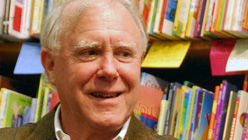In his new collection of essays “What Light Can Do,” Robert Hass offers insights and ruminations on a diverse range of subjects. The former U.S. poet laureate draws on his vast literary knowledge in essays that examine artistic works, the relationship between literature and religion and the backstory of a UC Berkeley protest. He joins us to discuss his essays and career.
Interview Highlights
On Writing Essays vs. Poems
I find it very hard to write both at the same time because you're thinking in different rhythms when you're doing them. I love and hate the essay form because of its requirements, both its requirements, that is you start the damn thing and you have to finish it and also you don't quite know where you're going. Poems have their way of telling you what they are and where they're going, in my experience. And in essay, you're climbing the cliff barehanded.
[Essays are] more arbitrary. You can either do it this way or you can do it that way. With poetry, the life of a poet consists of second thoughts, in a way. One poem generates another — in an essay you're kind of supposed to get it for now, on this subject.
On the Influence of James Baldwin
The essayist whom I read and fell in love when I was a college student, that made me fall in love with the essay was James Baldwin. Those early books of his — Notes of a Native Son, Nobody Knows My Name, those essays were so gorgeous and such a revelation. This would have been [in the] late 50s, early 60s, the early days of the civil rights movement… and these just luminous, magical pieces of writing on what it was like to live inside his skin, a black man's skin, in America and Europe in those years, were so gorgeous.
On Whether the Poet Has a Responsibility to Be Political
My first answer to that is always to think about Emily Dickinson who wrote three hundred of the best poems in the English language in the middle of the Civil War that seem mainly to have been motivated by the fact that her sister-in-law hurt her feelings.
